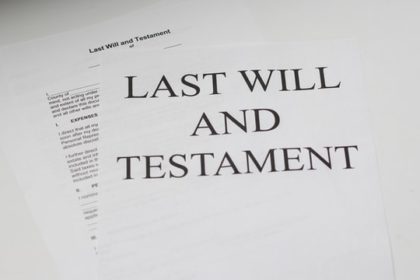
Written by Megan Brook, Candidate Attorney and checked by Jayna Hira, Associate
Introduction
Drafting a valid Will is vital in ensuring that one’s assets are distributed according to their wishes upon their death. In this regard, there are many legal formalities under South African law that one must consider when drafting their Will. These may seem straightforward but a small mistake may invalidate the entire document, resulting in the deceased dying “intestate” (without a Will).
This article will outline the basic statutory requirements for the drafting of a valid Will, as well as some practical considerations one should be aware of.
Statutory requirements
To begin with, one must consider the basic laws around Will drafting according to the Wills Act 7 of 1953, as amended (“The Act”). These include, but are not limited to:
- the writer of the Will (known as “testator” if male and “testatrix” if female) must be older than 16 (sixteen) years of age and mentally capable of understanding the consequences of their actions;
- the Will must be in writing; either handwritten or typed out. Video or voice recordings will not be accepted as a valid Will before a Court of Law;
- the testator/testatrix must sign at the end of the Will (preferably very close to the last line);
- the abovementioned signature must be made in the presence of two competent witnesses who are over the age of 14 (fourteen);
- the witnesses must too sign the last page of the Will;
- the definition of “sign” includes initialisation or the making of a mark, both forms requiring a Commissioner of Oaths to certify that he has satisfied himself as to the identity of the testator/testatrix and that the accompanying Will is the Will of the testator/testatrix; and
- if the Will is longer than one page, the testator/testatrix must sign every page of the Will, anywhere on the page. Although not a legal requirement, it is recommended that the two witnesses sign the other pages of the Will too.
Practical tips
Below are some useful tips to consider when drafting a Will:
- a beneficiary (who will benefit from the estate of the deceased) or Executor in terms of the Will should not sign the Will as a witness as they stand to be disqualified from inheriting.
Although a Court of Law may make an exception in this instance, section 4A(1) of the Act states that any person who signs a Will as a witness, or who writes it out in their handwriting on behalf of the deceased, is disqualified from receiving any benefit under that Will;
- it is highly recommended that one dates their Will in order to avoid confusion upon death in the event that more than one Will is found;
- one should sign their Will in duplicate or triplicate as the Master requires the original Will upon the deceased’s death and this ensures that an originally signed copy will be found;
- one must avoid unclear or vague language in their Will and leave no room for contestation or misinterpretation;
- one must remember to revoke all previous Wills and testamentary writings as this will pose a problem if previous Wills or codicils have been drafted; and
- one must make provision for divorce in their Will or immediately update their Will upon getting divorced. If one does not update their Will within 3 (three) months of getting divorced and their ex-spouse is a named beneficiary in the Will, it will be assumed that the deceased intended for them to inherit and they will remain a beneficiary.
In terms of Section 2B of the Act, if one dies within 3 (three) months of their divorce, their ex-spouse will be treated as having predeceased them and will be excluded from inheriting in terms of the Will (unless a contrary intention can be shown from the wording of the Will).
Amendment
One may amend his or her Will subsequent to drafting their final Will, subject to the following legal formalities:
- the amendment must be identified by the signature (or mark) of the testator/testatrix;
- the above identification must be done in the presence of two or more competent witnesses;
- if the amendment is identified by way of a mark, or someone signs the amendment on behalf of the testator/testatrix, a Commissioner of Oaths must certify the Will.
Basic clauses
Below are helpful examples of clauses that may be included in a Will, although the Act does not prescribe same.
- The heading: one should include a heading with the testators/testatrix’s name, identity number and current residential address.
- Revocation: as discussed above, one should always state “I revoke all previous Wills and testamentary writings.”
- Appointment of executor: one should state “I nominate A, failing him B, as the Executor of my estate.”
- Security: every Executor is required to furnish security to the Master of the High Court and so one may include the following clause in their Will in order to preclude the Executor from providing such security: “the Master of the High Court is directed to dispense with the necessity of my Executor furnishing security for the administration of my estate.”
- The right of assumption: an Executor may not substitute any other person to act in his/her place. However, the right of assumption will authorise an Executor to assume another as his co-Executor when the deceased includes the following clause in their Will: “I give my Executor the right of assumption.”
- Collation: if there is the collation, whatever a child of the deceased has received in their lifetime is deemed to be a part of their inheritance from the deceased, ensuring that each child inherits equally. If the testator/testatrix does not wish for collation to take place, he/she must state “there shall be no collation.”
- Attestation clause: at the end of the Will, the testator/testatrix should state “signed by me in the presence of two witnesses, all of us having signed in the presence of each other.”
What is an Executor?
A common question asked by the layman is what exactly is an Executor and who should one choose as same.
In basic terms, an Executor is an individual who carries out the wishes of the deceased based on what is spelt out in their Will. The Executor is responsible for ensuring that all of the deceased’s assets are accounted for and distributed to the correct parties. He or she will also have to see to the settling the debts of the deceased.
Before one elects an individual to be the Executor of their estate, one should ensure that he or she has a list of assets and debts of the testator/testatrix, including, but not limited to, bank accounts, insurance policies and investment accounts. One should also ensure that the Executor knows where the original Will is.
What is a testamentary Trust?
Another common question asked is what exactly is a testamentary Trust. This is a Trust set up in terms of a Will and only comes into effect upon the death of the deceased. This is beneficial in instances where the deceased wants to safeguard his or her assets which are bequeathed to minor children. The benefit will devolve upon a Trust until the minor attains majority (or a certain age as stipulated in the Will) and is able to handle their own financial affairs.
Due to the fact that children under the age of 18 (eighteen) cannot legally inherit, it is advisable to set up a testamentary Trust if one’s beneficiaries are minors. If one elects not to do so, the assets shall be deposited into the Guardians Fund which was created by the State and which purpose is to manage money on behalf of persons who are legally incapable or do not have the capacity to manage their own affairs.
Conclusion
One must be extremely careful when drafting their Will so as to ensure its validity. This article outlines the basic requirements of Will drafting, should one desire to draft their own Will, but it is advisable to contact an attorney should your Will be of a more complex nature.
Please note: this article is for general public information and use. It is not to be considered or construed as legal advice. Each matter must be dealt with on a case by case basis and you should consult an attorney before taking any action contemplated herein.



